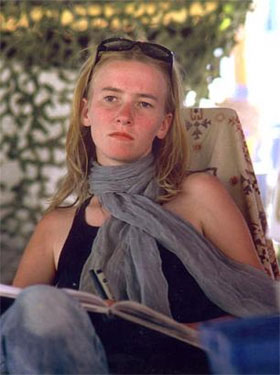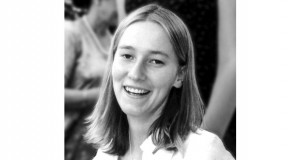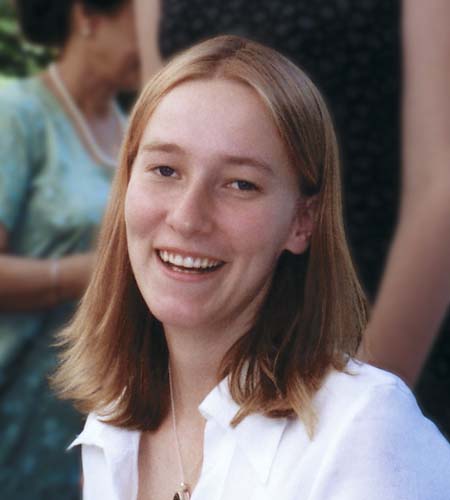By Jillian Kestler-D’Amours
28 August 2012 | Electronic Intifada, Haifa
The Haifa District court ruled earlier today that the Israeli military is not responsible for killing American activist Rachel Corrie, and that Corrie was to blame for her own death.
“Even when she saw the mount of earth moving towards her, she did not move away. The accident was caused by the deceased,” said Israeli Judge Oded Gershon, as he read out a summary of the 62-page ruling in front of a packed courthouse and with Rachel’s mother Cindy, father Craig and sister Sarah sitting in the front row.
Rachel’s death, Gershon said, “was not due to negligence of the state or any of its actors. The state did not violate the right of the deceased [Rachel Corrie] to life.”
Twenty-three-year-old American activist Rachel Corrie was crushed to death by an Israeli army bulldozer in March 2003. At the time of her death, she was trying to prevent Israeli demolitions of Palestinian homes in the Gaza border town of Rafah.
“There is no basis for the claim that the bulldozer hit her intentionally. It was a very unfortunate accident. I am confident the operator wouldn’t have continued if he saw her. This was an accident,” Gershon said, adding “the state is not responsible for damages in actions [that occur] in combat operations.”
Seven years in court
The Corrie family intends to appeal the Haifa District Court’s decision at the Israeli high court within 45 days.
The case was originally filed against the state of Israel in 2005 in Haifa District Court. The family accused the state of being responsible for Rachel’s death and of not conducting a thorough investigation into what happened.
Oral testimonies began in March 2010 and 23 witnesses have testified over 15 court hearings since that time. Israeli soldiers testified in court behind a curtain during the trial and a high-ranking Israeli army officer testified that there are no civilians in war.
“We are, of course, deeply saddened and deeply troubled by what we heard today,” said Rachel’s mother, Cindy Corrie, in a press conference following the verdict. “I believe that this was a bad day, not only for our family but a bad day for human rights, for humanity, for the rule of law and also for the country of Israel.”
Contrary to the court’s ruling, Cindy Corrie said that her family and their legal team believe that the Israeli soldiers driving the bulldozer saw Rachel the day she was killed. The family also said that Israeli military’s investigation into Rachel’s killing was wholly inadequate.
“I can say without a doubt that I believe my sister was seen as that bulldozer approached her,” said Rachel’s sister, Sarah, during the press conference. “I hope someday [the bulldozer driver] will have the courage to sit down in front of me and tell me what he saw and what he feels.”
The Israeli courts, Cindy said, holding back tears, are part of “a well heeled system to protect the Israeli military, the soldiers who conduct actions in that military” and “provide them with impunity at the cost of all the civilians who are impacted by what they do.”
“We believe that Rachel was seen. Everything that we knew coming into this process, reinforced by everything we saw and heard in court, confirmed our belief that at least one soldier knew she was there. [It was the soldiers’] ability and obligation to see who was in front of their machine. We believe someone in that bulldozer did,” she said.
Last week, the American Ambassador to Israel, Dan Shapiro, reportedly told the Corrie family that the Israeli military investigation into Rachel’s killing had not been “thorough, credible and transparent.” Shortly after Rachel’s death, then-Israeli Prime Minister Ariel Sharon promised US President George W. Bush that such an investigation would be conducted.
“We knew from the start that a civil lawsuit would be an uphill battle but as a family we had to push for answers for accountability and for justice. The diplomatic process between the United States and Israel failed us, and today the Israeli court system demonstrated its failure to us,” Cindy Corrie said.
The court’s ruling
As he read out the summary of his ruling, Israeli judge Gershon found that the Israeli military’s investigation into Rachel Corrie’s death was satisfactory.
He also ruled that the charges of assault and negligence levied against the Israeli military were unfounded, and that forcing Israel to pay damages to the Corrie family was unnecessary since Rachel’s death was unintentional.
Gershon added the area where Rachel Corrie was killed was a closed military zone and “daily combat region” and that the bulldozer’s work — which he said was clearing and flattening the land in the area — was absolutely necessary.
“The task of the army was to clear the area and to clear terrorist hiding places. There was an urgent need to perform this task. The task was not to destroy houses,” Gershon said, as he read a summary of the verdict in court.
In a press conference following the verdict, the Corrie family’s lawyer, Hussein Abu Hussein, said that the aim of the army’s operations the day Rachel Corrie was killed was to demolish the home of the Nasrallah family, with whom Rachel had been staying.
“It was not right because Rachel was living with this family of Dr. Nasrallah all the period before the killing. Here in this picture, you see how far the bulldozer [was] from the house of Dr. Nasrallah. Any human being who sees this picture can imagine that the aim of this activity in that day, was the destruction of the house of Dr. Nasrallah,” said the Corrie family’s lawyer, Hussein Abu Hussein.
Impunity for Israeli crimes continues
“While not surprising, this verdict is yet another example where impunity has prevailed over accountability and fairness. Rachel Corrie was killed while non-violently protesting home demolitions and injuries, injustice in Gaza and today this court has given its stamp on the approval to flout an illegal practices that fail to protect civilian life,” Abu Hussein said, as he read a prepared statement shortly after the verdict was announced.
“In this regard, the verdict blames the victim based on distorted facts and it could have been written directly by the state’s prosecution. We know from the beginning that we had an uphill battle to get truthful answers and justice, but we are convinced that this verdict distorts the strong evidence presented in court and contradicts fundamental principles of international law with regards to protection of human rights defenders,” Abu Hussein said.
The Rachel Corrie case has highlighted the lack of accountability that Israeli soldiers are held to when they commit crimes against Palestinians.
Earlier this month, an Israeli military court didn’t hold anyone accountable for the killing of two Palestinian women in Gaza during Israel’s attacks on the Palestinian territory in 2008-09. The women were killed when an Israeli soldier opened fire on them as they stood waving white flags.
“The Israeli military received strong evidence in dozens of cases that its soldiers killed Palestinians unlawfully during Israel’s ‘Operation Cast Lead,’ yet the military has indicted only four soldiers, and jailed none on such charges,” said Eric Goldstein, deputy Middle East director at Human Rights Watch.
“The scant accountability for the apparent crimes by Israeli soldiers casts grave doubt on Israel’s willingness to prosecute crimes by its forces” (“Israel: 2009 Killings of Mother and Daughter Unresolved,” Human Rights Watch, 22 August 2012)
Indeed, Rachel’s father, Craig Corrie, said that his daughter’s killing highlighted this impunity, and showed just how the Israeli army “thought [it] could kill people on the border with impunity.”
He explained how, within a seven-week period in 2003, Rachel, British activist Tom Hurndall and British journalist James Miller were killed in the same area of Gaza.
According to Human Rights Watch, the Israeli army demolished over 2,500 Palestinian homes in Gaza from 2000 to 2004; two-thirds of that number were in Rafah alone. “That was why Rachel was there. That context was almost not permitted within the courtroom at all,” Craig said.
“There was a family behind that wall and she knew that family. She slept on the floor in the parents’ bedroom because they couldn’t sleep in the children’s bedroom because they were being fired at by Israeli soldiers. She knew that family and she knew they stood behind that wall,” he added.
“Knowing that, how could she move?”
Jillian Kestler-D’Amours is a reporter and documentary filmmaker based in Jerusalem. More of her work can be found at jkdamours.com.
 International Solidarity Movement Nonviolence. Justice. Freedom.
International Solidarity Movement Nonviolence. Justice. Freedom.



